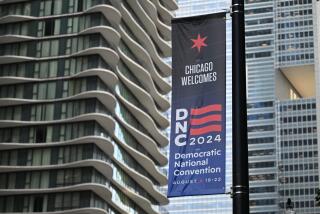Boston Businesses See Bust, Not Boon
BOSTON â Bostonians awoke Thursday to an unusual thank-you note from the mayor.
In a full-page ad in the cityâs two major newspapers, Mayor Thomas M. Menino offered residents a weekend of free parking, free concerts, discounted shopping -- even reduced rates on Bostonâs quirky duck tours, amphibious vessels that are a quintessential tourist attraction.
âHave a great weekend!â wrote the mayor, who arranged for businesses to pick up the costs of his generosity.
The goodwill gesture came in response to bitter complaints about disappointing revenue and angry questions about the benefits of bringing 35,000 people to town for the Democratic National Convention. Officials Thursday stood by predictions that the first national nominating convention in the cityâs history would bring $154 million to Boston in a yearâs time. Experts on urban economics also said political conventions could be windfalls to the cities that hold them.
But the rosy long-range forecast and the mayorâs appreciative missive felt hollow to restaurateurs whose convention-week business plummeted by 70% or more, hoteliers who had more empty rooms than they bargained for and residents who fled rather than endure transportation and security headaches.
âThe thoughtâs there, but that doesnât help my bank account,â said John Caparella Jr., owner of Mother Annaâs restaurant in Bostonâs North End -- where Paul Revereâs âone if by land, two if by seaâ church is located and where the cityâs Italian immigrants settled.
That sentiment echoed throughout Boston, a city of neighborhoods that Menino had promised would prosper when the Democrats came to town.
Gretchen Chauncey, general manager of the Chandler Inn in Bostonâs South End, said that in daily calls to fellow innkeepers, he found that hotels were averaging about 70% occupancy despite the crush of visitors. Usually at this time of year, she said, âyou would expect to be running in the 80% to 85% range.â
On Newbury Street, the most fashionable address in the cityâs chic Back Bay, Don Cannon was so enthusiastic about the convention that he hung a giant sign that read âArt is Democraticâ in front of his gallery, the Copley Society of Art. But âeven the normal flow of trafficâ failed to materialize, Cannon said, as local customers bolted to avoid crowds, closed roads and a law enforcement presence that gave Boston the air of a police state.
The empty parking spaces on Newbury Street âtell you everything you need to know about the effect of the DNC,â he said.
In South Boston, Karen Stanley said she and fellow members of her areaâs Chamber of Commerce handed out neighborhood maps and carnations to 500 Democratic bigwigs who attended a clambake. They also draped giant American flags from two firetrucks as a reminder that the area where the cityâs busing crisis took place 30 years ago had changed.
Despite the hospitality, delegates did not swarm back to shop at her boutique or any of the stores along South Broadway, Stanley lamented.
âWe definitely took a hit,â she said. âA big hit.â
Out in Jamaica Plain, Noah McKenna scooped double-decker ice cream cones at J.P. Lickâs, a landmark in one of the cityâs most diverse neighborhoods, oblivious to the influx to his city, or even the inconveniences.
âExcept for what we saw on the news, itâs like. âWhat convention?â â McKenna said.
Although the mayor on Thursday escorted the Rev. Jesse Jackson on a tour of Roxbury -- a largely African American neighborhood -- press secretary Seth Gittell reiterated what Menino had said repeatedly: that âthis will be a tremendous plus to the city, especially in the long term -- not just the four days.â
Gittell said that disappointment on the part of Boston business owners was âa product of excessive expectations.â
A short-term loss in trade and tourism was always a factor in calculations about how the convention would affect the city, said Susan Elsbree, spokeswoman for the Boston Redevelopment Agency. Elsbree said the $154-million projection was based on âa very conservative, thoughtful economic analysis.â
Elsbree said the figure -- a one-year estimate -- took into account âthe very first dollar spent by the Boston host committee or the Boston Democratic National Committeeâ and included âall the dismantling, carting all the barricades back to New Hampshireâ and attendant expenses.
âWe still think it is a valid figure,â she said. âThis has always been about long-term economic analysis and impact, and positioning our city in a new way for the international stage.â
Officials donât know yet what the short-term costs will be. But in addition to the loss of business, there have been large overtime payments to police and transit workers. Equipment rental as well as the costs of setting up and taking down road barriers also have not been calculated.
But Elsbree was adamant that the convention would be a boon to Boston. And, she said, âwe would absolutely do it again.â
Menino was more cautious. âOnce per career,â he said when asked if he planned to invite another political convention.
In Washington, Chris Walker of the Urban Institute said that barring âlasting reputational damageâ from riots or other incidents, cities invariably benefited from large conventions that drew international attention.
âIf a city like Boston has in fact pulled this off, that is information that rapidly becomes transmitted through the networks of people who schedule conventions and handle travel,â said Walker, an expert on community and economic development. âIn terms of economic health, a major convention like this will contribute to the notion of Boston as a good place to do this kind of business.â
Still, Walker admitted that âin some cases, there can be real hardship,â and âin the short term, that can be very upsetting as a lot of the traditional economic revenues are foregone.â
Outside the restaurant his family has owned for more than 60 years, John Caparella Jr. invited police officers in for free pasta and said he wasnât especially interested in long-term economic analysis.
Caparella also said he doubted he would take advantage of the mayorâs thank-you package to the city.
âI donât think so,â he said. âIt just feels like pulling a Band-Aid on a huge open wound.â
More to Read
Sign up for Essential California
The most important California stories and recommendations in your inbox every morning.
You may occasionally receive promotional content from the Los Angeles Times.










